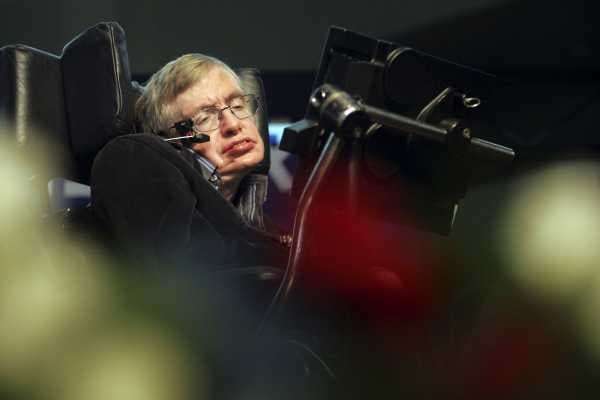
Stephen Hawking once proclaimed he had gathered “experimental evidence that time travel is not possible.” The experiment? A party for time travelers he hosted in 2009. But he didn’t send out the invitation until the party was over. “I sat there a long time, but no one came,” he explained in the documentary Into the Universe. It must be proof time travel is not possible: What self-respecting time traveler could resist the chance to drink champagne with the famed physicist?
Hawking died Wednesday (coincidentally on Albert Einstein’s birthday and Pi Day), at the age of 76 at his home in Cambridge, England. He was a genius but also playful, with an extraordinary ability to bring science to the masses and spark a sense of wonder in us all.
“The first thing that comes to mind [about Hawking] is not his science but about how he opened a door for so many people into the world of science,” Sara Seager, an MIT professor of physics and planetary science, told Vox.
Seager is one of the world’s leading experts on how to find life on other planets. And she traces her interest in the cosmos back to a simple purchase she made in high school: Hawking’s best-selling book A Brief History of Time.
Hawking overcame a severe neurodegenerative disease to become one of the most famous scientists of all time
Hawking was born on January 8, 1942 (coincidentally on the 300th anniversary of Galileo’s death). In 1963, while he was a rising-star graduate student at the University of Cambridge, he was diagnosed with amyotrophic lateral sclerosis (ALS, also known as Lou Gehrig’s disease), a neurodegenerative disease that slowly took away his ability to move on his own.
He was told he had two years to live. He lived for 55 more, dedicating his life to achieving a “complete understanding of the universe, why it is as it is, and why it exists at all,” as he once said in a BBC documentary. Arguably, he became the most famous scientist in the world.
In the 1980s, he needed tracheotomy surgery to keep breathing and lost his voice. After that, he communicated via a text-to-speech computer apparatus, where he had to painstakingly choose one letter at a time to respond to questions, write scientific papers or books, and give talks. “Given how much effort it took him to get a word on paper, he was incredibly generous,” said Sarah Demers, a physicist at Yale.
Hawking’s work explains how black holes (slowly) die
As a scientist, Hawking is most famous for proposing a form of radiation that bears his name: Hawking radiation, which helps explain how black holes function. Black holes are the densest, most violent objects in the universe. Nothing is supposed to escape the grasp of their extreme gravity.
Combining insights from Einstein’s theory of general relativity with quantum mechanics (two branches of physics that normally don’t play nice with each other), Hawking was able to figure out, theoretically, that black holes do lose mass over time. The finding meant that black holes aren’t permanent. They, like stars, have a life cycle, and eventually die. (Hawking adapted this finding into some useful advice for those dealing with depression: “Things can get out of a black hole both on the outside and possibly to another universe. So if you feel you are in a black hole, don’t give up — there’s a way out.”)
For physicists, Hawking radiation “opened up a whole new direction of inquiry about the foundations of how gravity and quantum physics interrelate that has yet to reach its final conclusion,” Cliff Burgess, a particle physicist at McMaster University in Canada, said.
Hawking’s findings probed the universe at its extremes. He and fellow physicist Roger Penrose were able to show that Einstein’s theory of relativity predicts that singularities exist within black holes (i.e., regions of space where the force of gravity is infinite), and that if you trace backward the history of the universe, it likely began with a singularity (the Big Bang).
Hawking’s discoveries did something physicists love: They answered questions and provoked many, many new ones. They also earned Hawking many of the top scientific medals and honors in the world.
France Córdova, an astrophysicist and current director of the National Science Foundation, told Vox that she first met Stephen Hawking when she was a graduate student at Caltech. “His insights into the nature of the universe assured all of us young scientists that the cosmos was far stranger, far more interesting than we could have imagined,” she said.
As a cultural figure, Hawking is most famous for A Brief History of Time, which discusses how the universe came to be, how it might end, and how physicists are still stumped by the big questions that explain it all. It has sold more than 10 million copies and propelled him into superstardom.
In 2014, his story — and his trials learning to live with his disease — were adapted into a movie, The Theory of Everything. His artificial voice has become iconic, making appearances on shows like The Simpsons and John Oliver’s Last Week Tonight.
“Remember to look up at the stars and not down at your feet”
In recent years, Hawking has implored humanity to keep thinking about the long-term future of our species. He has expressed grave concern about climate change and whether we should consider the advent of artificial intelligence as a threat to humanity. He has said colonizing other planets will be essential for our long-term survival. “We are running out of space and the only places to go to are other worlds,” he said.
In 2016, he and Mark Zuckerberg co-launched Breakthrough Starshot, an audacious plan to send tiny spaceships to our nearest stellar neighbor, Alpha Centauri. The star is more than 4 light-years away. The project might take a decade to get off the ground and decades more to reach its destination, and still more time to send any data back to Earth.
Hawking won’t see the project to its completion. Perhaps very few of us will. But Hawking understood that his life’s work — a “complete understanding of the universe” — was an intergenerational quest.
“We are just an advanced breed of monkeys on a minor planet of a very average star,” Hawking once said. “But we can understand the universe. That makes us something very special.”
Or, as he often said, “Remember to look up at the stars and not down at your feet.”
Correction: An earlier version of this post stated Hawking was born on Isaac Newton’s birthday. This is incorrect. Hawking was born on the 300th anniversary of Galileo’s death.
Sourse: vox.com






